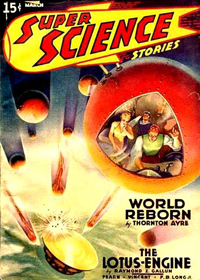An ongoing dialogue on HIV/AIDS, infectious diseases,
April 23rd, 2013
Two Papers, Four Sofosbuvir Studies, and Soon the End of “Interferonologists”
 Today, as the The International Liver Congress is about to start, two papers are published in the New England Journal of Medicine on sofosbuvir, the investigational anti-HCV nucleotide submitted to the FDA for approval earlier this month.
Today, as the The International Liver Congress is about to start, two papers are published in the New England Journal of Medicine on sofosbuvir, the investigational anti-HCV nucleotide submitted to the FDA for approval earlier this month.
Each paper actually includes within them two studies. (For some reason, all the studies sound like 1950s science fiction magazines.) Typical of the frenetic pace of drug development for HCV, the trial designs are a byzantine mish-mash of study populations, strategies, and endpoints, which can make interpretation complex. As a result, here’s an attempt to summarize some key outcomes, with a focus on the bottom line — cure — making the not-so-bold leap that “sustained virologic response at 12 weeks” = “cure”.
One paper looked at treatment-naive patients with any HCV genotype, and included the NEUTRINO and FISSION studies. NEUTRINO was a single-arm treatment with peg IF, RBV and sofosbuvir for genotypes 1, 4, 5, and 6, and FISSION a randomized comparison between sofosbuvir and interferon (both with RBV) for genotypes 2 and 3:
- NEUTRINO: Genotype 1, 12 weeks of peg IF + RBV + sofosbuvir: 89% cure
- NEUTRINO: Genotype 4, 12 weeks of peg IF + RBV + sofosbuvir: 96% cure (Note: very few genotype 5 or 6 patients)
- FISSION: Genotype 2, 12 weeks of RBV + sofosbuvir: 97% cure
- FISSION: Genotype 3, 12 weeks of RBV + sofosbuvir: 56% cure
In the randomized comparison for the genotype 2/3 patients, response rates were similar between sofosbuvir for 12 weeks and interferon for 24 weeks (both with RBV); the sofosbuvir strategy was better tolerated. No resistance to sofosbuvir was detected in any patient.
The other paper — remember, also with two studies — looked only at patients with genotype 2 or 3 HCV, and in whom “peginterferon is not an option”. In one study (POSITRON), this could be for multiple reasons, such as prior adverse effects, concurrent medical conditions, or just refusing interferon; they were randomized to RBV + either sofosbuvir or placebo for 12 weeks. In the other study (FUSION), these were patients who did not respond to prior treatment with interferon, randomized this time to 12 or 16 weeks of RBV + sofosbuvir. Again, some cure rates (all genotype 2 or 3):
- POSITRON: Interferon not an option, 12 weeks RBV + sofosbuvir: 78% cure
- POSITRON: Interferon not an option, 12 weeks RBV + placebo: 0% cure (Note: must have included this for safety reasons, right?)
- FUSION: Prior non-response to interferon, 12 weeks RBV + sofosbuvir: 50% cure
- FUSION: Prior non-response to interferon, 16 weeks RBV + sofosbuvir: 73% cure
Patients with cirrhosis and/or genotype 3 didn’t do as well — extending the treatment to 16 weeks seemed to increase cure rates
No doubt these are terrific results, suggesting that sofosbuvir-based therapy will be both more effective and better tolerated than current standard of care. And also no doubt this week’s “Liver Congress” will have further interferon-sparing studies for HCV that could make these published studies seem out of date, even before the sofosbuvir is approved.
Nonetheless, as of right now — April 23, 2013, 2:43 PM EST — as an editorialist appropriately notes, it’s not quite time to say farewell to the “Interferonologists” among us who spend the bulk of HCV treatment time managing side effects.
The good news is that time is undoubtedly coming soon.


How about payment for these medications? Many infected people are very ill and cannot work. Will Medicare cover all of the associated costs so that people can get these medications? What Medicare plans will people need to be signed up for in order to have all of the costs covered for these medications?
Yes, how can a person with Genotype3A out of work 8 months, disabled, lousy insurance, cirhossis and 3 small lesions get the $40,000 (est) to take the RBV + sofosbuvir? Without MediCal or Medicare, there is nothing to put down on the table to get the treatment.
This, to me, would make sofosbuvir a stitch not in time. A dollar short and a day late. Hundreds of millions have this disease, and if it takes out an entire generation, it will look like the HIV disasters in Africa.
So, if the price cannot come down, what’s the point of the investment? Marketing has failed to answer the question “Who’s your customer”.
Hello, I work for a specialty pharmacy. We are able to talk to insurances and obtain coverage for this and several other medications that have costs in the thousands. Nobody expects patients to be able to afford these medications, and many insurances do not cover them automatically. But your doctor can initiate a prior authorization and with that, your medication can be covered and/or may have an affordable copay. Patient assistant programs are also available
What new medicines have been developed to effectively treat African-Americans who have Hep C? Historically, it appears that African-Americans have not enjoyed the same prospective cure rates as other ethnic groups by a substantial margin. I would welcome a report or study that can address the specific results of cure rates of African-Americans and other ethnic groups.